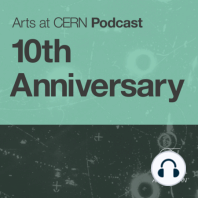32 min listen
5: Black Holes: Suzanne Treister & Alessandra Gnecchi
FromArts at CERN
ratings:
Length:
29 minutes
Released:
Jul 13, 2022
Format:
Podcast episode
Description
Over her forty-year career, artist Suzanne Treister has developed a large body of work that engages with unconventional bodies of research focusing on the relationship between new technologies, alternative belief systems and the potential futures of humanity.
As a winner of the Collide Award, Suzanne was in residence at CERN in 2018 and collaborated with theoretical physicist Alessandra Gnecchi, whose research focuses on supersymmetric theories and black holes. During her time in the Laboratory, Suzanne developed her project The Holographic Universe Theory of Art History. THUTOAH investigates the theory that our universe could be understood as a hologram and hypothesises that artists may have also been attempting to describe the holographic nature of the universe.
In this conversation, they talk about the science of black holes, the hypothesis of the Holographic Universe and how their collaboration at CERN helped to shape Suzanne’s art installation THUOAH.
The conversation is hosted by Mónica Bello, Curator and Head of Arts at CERN.
Arts at CERN is made by Reduced Listening. The producer for this episode is Rebecca Gaskell, and the executive producer is Jack Howson.
As a winner of the Collide Award, Suzanne was in residence at CERN in 2018 and collaborated with theoretical physicist Alessandra Gnecchi, whose research focuses on supersymmetric theories and black holes. During her time in the Laboratory, Suzanne developed her project The Holographic Universe Theory of Art History. THUTOAH investigates the theory that our universe could be understood as a hologram and hypothesises that artists may have also been attempting to describe the holographic nature of the universe.
In this conversation, they talk about the science of black holes, the hypothesis of the Holographic Universe and how their collaboration at CERN helped to shape Suzanne’s art installation THUOAH.
The conversation is hosted by Mónica Bello, Curator and Head of Arts at CERN.
Arts at CERN is made by Reduced Listening. The producer for this episode is Rebecca Gaskell, and the executive producer is Jack Howson.
Released:
Jul 13, 2022
Format:
Podcast episode
Titles in the series (5)
1: Extra Dimensions: Julius von Bismarck & Michael Doser by Arts at CERN
